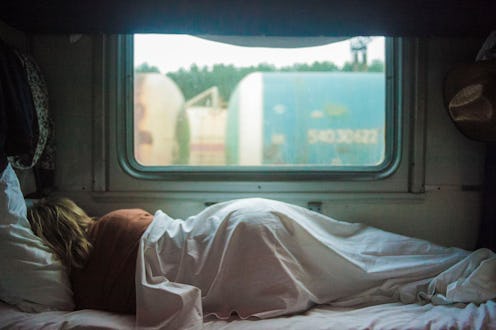Life
Does Daylight Saving Time Affect Your Health?
As Daylight Saving Time approaches, the dread of losing an hour of sleep looms with it. Though, aside from one night of less sleep, DST is far more exciting than it is unfortunate, bringing with it longer nights filled with BBQs, date night at Major League Baseball games, and the warm weather seasons filled with beach days. While there's so much to look forward to beyond the early days of Daylight Saving Time, there is an adjustment period that demands some serious coping skills not to feel like you've fallen into a deep hole of Mercury Retrograde.
To uncover the best ways to handle the change in sunlight and time during DST, I consulted with Dr. Robert Oexman, Director of the Sleep to Live Institute, and Sleep Expert Dr. Joseph Krainin, founder and president of Singular Sleep, LLC and chief medical expert for SoClean.com.
According to Dr. Krainin, "Greater exposure to natural light does enhance overall health so the intent of maximizing daylight is good. However, the trick is to manage the transition since internal body clocks need to be reset — especially difficult in the spring. The first week of Daylight Saving Time historically shows an increase in fatal car accidents since many drivers are drowsy until they adjust."
To make a seamless transition into Daylight Saving Time on Mar. 12 and keep your health in check, adhere to the following tips.
Prepare Your Body To Lose Sleep
According to Dr. Oexman, "Our bodies and minds are used to going to bed and waking up at a certain time. By adjusting the clocks, we are disrupting that pattern because we may stay up until 10 o’clock at night, but [during DST] 10 p.m. is 11 p.m. and we aren’t tired yet. So, we stay up that extra hour, which doesn’t help us when we need to be up by 6 a.m."
To add to that, Dr. Krainin tells Bustle via email, "Our bodies' circadian rhythms are not fixed, but it is easier to 'phase delay' (stay up later) than 'phase advance' (go to bed earlier). In general, it takes most of us 50 percent longer to adjust to the advances than the delays.”
In short, it's much easier to stay up past your bedtime than it is to try to go to bed much earlier than you usually do. Thus, when DST begins, it will be difficult to offset the hour lost by hitting the sack ahead of schedule on the night of the time change.
"To pre-adapt before DST, go to bed 20 minutes earlier for the three nights leading up to DST and get exposure to bright light first thing in morning to advance circadian rhythms," Dr. Krainin suggests.
For another quick tip, Dr. Oexman adds, "It is important to have a dark room while sleeping. With the sun staying out longer, it may be dark out but still capable of disrupting us from falling asleep."
Be Consistent With Your Routine
"Consistency is key. Once our clocks switch, it is important to maintain the same bedtime routine. You don’t want to stay up an hour later because you’re not tired yet. Keeping a routine will allow your body to adjust easier and quicker," Dr. Oexman tells Bustle.
Avoid falling into a groggy state by sticking to your schedule. As you get older, it's more difficult to bounce back — as depressing as it is, it's true.
Be Conscious Of Your Sleep Time Habits
Dr. Oexman suggests fostering an environment for sleep in order to avoid health problems brought on by DST. He further explains, "With the sun setting later, close your blinds to block out the light. With the time change comes warmer weather so it is important to monitor the temperature of your room. You want to have a cool sleeping environment."
As you've likely heard a million times over, electronics are a big red flag in the bedroom. As Dr. Oexman says, "Don’t let there be light. While this tip is important all year round, keep electronics out of the bedroom. The blue-light emitted from electronics inhibits the production of melatonin, which we need to fall asleep and stay asleep."
If you're having difficulty sleeping, herbal supplements may help your cause. "Strategic use of small amounts of melatonin [contribute to a better night's sleep]. Take .5 mg or less four to five hours before bedtime to help you fall asleep earlier," Dr. Krainin tells Bustle via email.
Test Different Solutions To Battle Exhaustion
If you like to keep it simple, "Step outside. When you’re active, it makes it easier to sleep. Enjoy the extra daylight," Dr. Oexman says. A quick walk outside to soak up the sunlight and feel the cool breeze on your face is sometimes all you need for an extra burst of energy.
If you're a fan of the java jolt for an energy bump, Dr. Krainin suggests "strategic use of caffeine. If you are dragging on Monday morning with the clock change, take or drink caffeine to combat mental fatigue. It takes 20-30 minutes to absorb caffeine from the GI tract."
If all else fails to help you cope with the time change during Daylight Saving Time, "Move to Arizona," Dr. Krainin jokes, further justifying, "The Grand Canyon State is the only state in the US that does not observe Daylight Saving Time."
